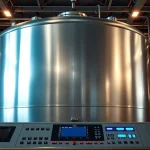Overview of Smart Factory Concepts
Smart factories are a cornerstone of modern advanced manufacturing, encapsulating the principles of Industry 4.0. They represent a leap in how manufacturing processes integrate automation, connectivity, and real-time data collection. A key feature of smart factories is their ability to monitor and analyze data from every aspect of the production line. This facilitates what is known as data-driven decision-making.
In Industry 4.0, smart factories stand out by utilizing the Internet of Things (IoT), artificial intelligence (AI), and automation technologies. These components collaborate to create a seamlessly integrated production environment. For example, sensors collect data on machinery performance and product specifications, feeding it back for analysis and real-time adjustments.
Have you seen this : Transforming UK Agriculture: Leveraging IoT for Enhanced Crop Monitoring and Growth
The importance of data-driven decision making cannot be overstated. It helps manufacturers anticipate demands, optimize resource allocation, and minimize waste. Moreover, it supports the development of customized products, tailoring to market needs rapidly and efficiently. Smart factories thereby enhance the overall agility and responsiveness of manufacturing entities, allowing for improvements in efficiency, quality, and production scale. This cohesive approach to manufacturing reflects the essence of advanced manufacturing promoted by Industry 4.0.
Practical Strategies for Implementation
Implementing smart factory technologies requires a strategic approach to digital transformation. Technology adoption begins with an assessment of current manufacturing processes. This involves identifying areas ripe for improvement and potential technological integration. A practical assessment helps manufacturers understand existing inefficiencies and how digital solutions can address them.
Also to read : Transforming UK Event Planning with Cutting-Edge Data Analytics for Unforgettable Guest Experiences
Integrating IoT and automation technologies is a crucial step in this transformation. IoT devices can enhance connectivity by collecting real-time data across various stages of production. Automation streamlines operations, reducing human error and increasing consistency in output. These technologies work together to transform production lines into agile and responsive systems.
Training the workforce for new technologies is also vital. Employees must adapt to advancements and develop relevant skills. Upskilling programmes ensure that the workforce is competent in managing and maintaining advanced manufacturing systems. Employers can foster a culture of continuous learning by providing support and resources.
Successfully implementing smart factory technologies involves a careful blend of technology adoption and workforce preparation. With clear strategies, manufacturers can realize the full potential of digital transformation, promoting growth and competitiveness in their operations.
Case Studies from UK Manufacturers
Exploring real-world case studies offers valuable insights into successful implementation of smart factory technologies within UK manufacturing.
Company A: Transforming Production Lines
Company A faced challenges in optimising its production lines. By implementing advanced automation processes, they achieved significant improvements. Robotics and IoT devices were integrated, enhancing efficiency and reducing manual errors. Such technologies allowed Company A to respond swiftly to production demands, showcasing a model of successful transformation.
Company B: Leveraging Data Analytics
Utilising data analytics became a game-changer for Company B. They confronted inefficiencies in operations and turned to real-time data collection. These initiatives provided a precise understanding of production bottlenecks, leading to informed decision-making and streamlined processes. Consequently, production predictability improved, exemplifying the power of analytics.
Company C: Enhancing Supply Chain Management
Company C addressed supply chain management challenges by implementing digital transformation strategies. They integrated IoT solutions to track inventory and logistics, fostering better coordination and reducing delays. This approach strengthened their supply chain, illustrating the strategic use of smart technologies to enhance responsiveness and operational agility.
Potential Benefits of Adopting Smart Factory Technologies
Adopting smart factory technologies can unlock a host of transformative benefits for manufacturers. Central to these benefits is the increased operational efficiency that such technologies facilitate. By automating routine tasks and integrating IoT, smart factories reduce downtime and waste, leading to substantial cost savings for businesses.
Another significant advantage is the enhancement of product quality and customization. Smart factories enable precise monitoring and control across production lines, ensuring consistent quality. Furthermore, data-driven capabilities allow for the rapid adaptation of manufacturing processes to produce customized products that meet specific market demands with agility.
Improved agility and responsiveness to changing market conditions is also a noteworthy benefit. Smart factories equipped with advanced analytics and real-time data processing can swiftly adapt to consumer trends, minimize lead times, and offer faster product rollouts. This agility is crucial in maintaining competitiveness in the fast-paced manufacturing landscape.
Overall, embracing smart factory technologies is pivotal in fostering more efficient, customizable, and agile manufacturing operations. By investing in these technologies, businesses position themselves to capitalize on evolving market opportunities, enhancing their productivity and safeguarding against potential disruptions.
Challenges in Implementation
Implementing smart factory technologies presents several challenges that can act as significant barriers to adoption. Financial and resource constraints are among the most prominent hurdles. Transforming traditional manufacturing processes into smart manufacturing ecosystems often requires substantial investment. This includes costs associated with acquiring new technologies, updating infrastructure, and training personnel.
Another significant barrier is the resistance to change within the workforce. Employees accustomed to conventional methods may find it difficult to adapt to new technologies and workflows. To mitigate this, a robust change management strategy is crucial. This involves engaging employees early in the process and providing ample support and training opportunities to smooth the transition.
Additionally, integration complexities with existing systems can pose technological hurdles. Smart technologies need to seamlessly connect with legacy systems to ensure smooth operations and data flow. Overcoming these challenges requires thorough planning and the possible engagement of technological experts who specialize in system integration.
By addressing these barriers thoughtfully, manufacturers can facilitate a smoother transition towards smart factory adoption, ultimately enhancing productivity and competitiveness in the global market.
Future Trends in Smart Manufacturing
As smart manufacturing evolves, emerging technologies are at the forefront, and AI and machine learning play pivotal roles. These innovations enhance process efficiency by predicting maintenance needs and optimizing production schedules. Machine learning, for instance, analyses vast datasets to identify patterns, improving decision-making accuracy for manufacturers.
The trend towards sustainable manufacturing practices is gaining traction, with smart factories prioritizing eco-friendly operations. Integrating renewable energy sources and minimising waste production reflect industry efforts towards environmental responsibility. Innovations such as closed-loop systems showcase commitment to sustainability, reducing environmental impact while maintaining productivity.
Looking ahead, the UK manufacturing landscape anticipates significant transformations. The integration of 5G technology promises robust connectivity, facilitating faster data exchange and real-time monitoring across production lines. Such advancements bolster the agility and responsiveness of manufacturing processes, helping businesses adapt swiftly to market changes.
As these technologies mature, collaboration between tech providers and manufacturers becomes essential. The focus on sustainable practices and leveraging AI and machine learning ensures smart factories remain competitive and responsive to future demands, reflecting a forward-thinking approach to advanced manufacturing.
Actionable Tips for Manufacturers
Navigating the smart factory transformation requires not only technological insight but strategic action. Here are some actionable tips for manufacturers embarking on this journey:
-
Evaluate Relevant Tools & Technologies: Assessing the right tools and technologies is crucial. Consider investing in IoT devices and AI-driven analytics for real-time data insights. Tailor these choices to enhance specific manufacturing operations, increasing overall efficiency.
-
Build Strong Partnerships: Collaborate with technology providers who specialise in smart manufacturing. Engage their expertise in deploying and managing technology across manufacturing processes. They can offer tailored solutions that align well with your facility’s unique objectives.
-
Cultivate Continuous Learning: The fast-paced evolution of Industry 4.0 requires ongoing adaptation. Encourage teams to engage in continuous learning and training programs. Focus on developing skills compatible with advanced manufacturing technologies to maintain competitiveness.
These strategies are designed to enhance both the technical and human facets of manufacturing in today’s dynamic landscape. By embracing these best practices, manufacturers can effectively harness the potential of smart factory innovations and achieve significant advancements in production operations.
Expert Opinions and Insights
Incorporating expert opinions into the discussion of smart factories reveals critical insights into their potential. Industry leaders emphasise the transformative effects of smart factory technologies on the manufacturing sector. Insights from analysts suggest that smart factories are reshaping the industry by driving increased efficiency and innovation. A prominent expert explains that these technologies enable real-time data collection and analytics, crucial for making informed decisions swiftly and decisively.
Interviews with experts also highlight the necessity of sustainable manufacturing practices. They advocate for integrating eco-friendly technologies to ensure a minimal environmental footprint. Industry thought leaders stress how AI and machine learning enhance manufacturing processes, increasing product quality and reducing waste. Those consulted advocate for manufacturers to adapt quickly to these technological shifts to maintain a competitive edge.
Further, commentary on policy developments indicates a governmental push towards encouraging technology integration in manufacturing, aimed at bolstering economic growth. Experts recommend close monitoring of these policies to capitalise on emerging opportunities. Their guidance underscores the vital role of smart technologies in shaping the future of manufacturing, emphasising that staying informed and proactive is key to success.
Resources for Further Reading
Exploring various resources is essential for gaining deeper insights into smart manufacturing. Reading authoritative industry publications and studies can provide valuable details on the latest trends and technologies. Recommended reading materials include:
-
Books: Titles such as “Industry 4.0: The Industrial Internet of Things” and “Smart Manufacturing: The Benefits and Risks of Data-Driven Technology” offer comprehensive overviews of the industry evolution.
-
Articles: In-depth articles in journals like “Journal of Manufacturing Processes” and “International Journal of Production Research” provide scholarly insights into current practices and advancements.
-
Online Platforms: Engage with communities like the Smart Manufacturing Leadership Coalition and forums on platforms such as LinkedIn. These spaces are excellent for exchanging experiences, challenges, and strategies with peers who are navigating similar transitions.
-
Studies: Consider examining reports from organisations such as The World Economic Forum and McKinsey & Company, which offer data-driven analyses of industry transformations.
These resources not only provide knowledge but also foster connections within the global manufacturing community. By investing time in further reading, manufacturers can stay informed and aligned with cutting-edge developments.











